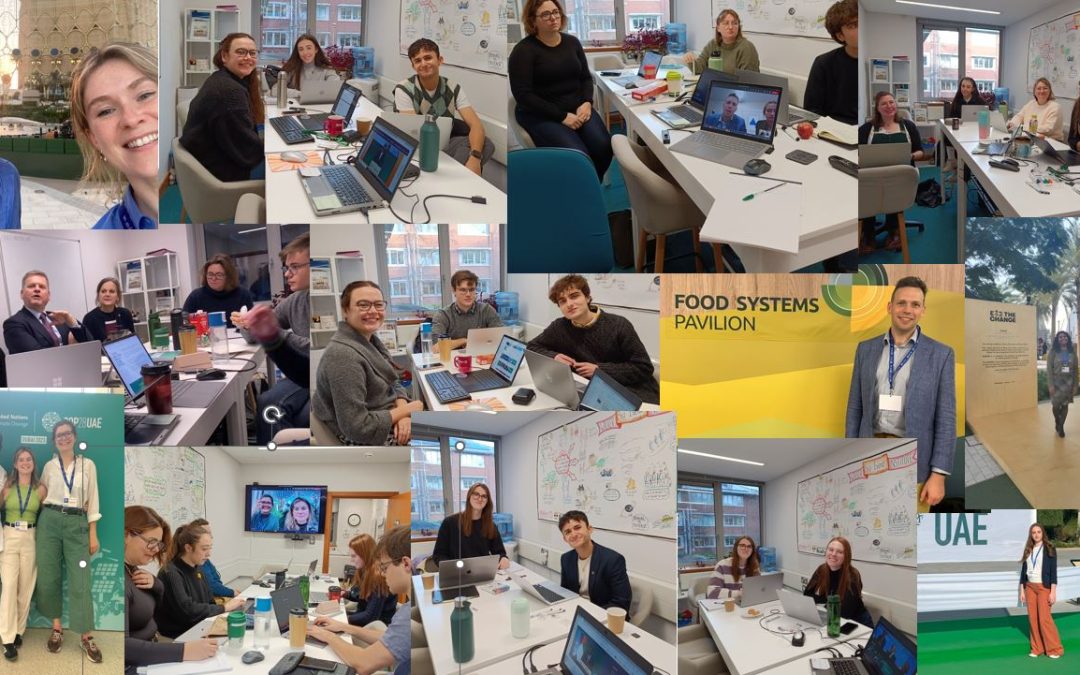Written by PhD student Alex Moores from FoodBioSystems DTP
Youth activists have spoken out against the minor role that food systems have played in this year’s summit, which they see as being in stark contrast to the large influence that this sector has on the climate crisis. Based on the size of contributions, the only sector with a larger impact is the fossil fuel industry, with a third of greenhouse gases released by mankind traceable back to food production and consumption.
The press conference, which included speakers from Mexico, Germany, Ghana, Argentina, Iran, Canada and Brazil, took place on COP28’s final day, as global leaders finalised the legal commitments central to the negotiations at the summit. Panel members criticised the disparity between the work civil and national actors have done to increase the recognition of food systems at the summit and the actual level of inclusion in the legal texts. Despite the scientific consensus, that food systems are causing irreparable harm to the planet, the final legal texts do not yet recognise the need to produce and consume food in a less impactful way.
Stephanie Cabovianco, activist and global director of the Climate Save Movement, sees these texts as “the greatest moment since the adoption of the Paris Agreement. So we really need to have food systems as part of the conversation.”
On the second day of the COP28 summit, 134 countries signed a declaration on sustainable agriculture and food systems resilience. This document, while not being legally binding, recognises the distinct relationship between food systems and climate change. It also affirms that movement towards limiting global temperature rise to well below 2°C must consider the role of food systems.
Stephanie argued that despite it being non-binding, the declaration has encouraged some positive discussions.
“I think it’s not ideal that we don’t have a formal negotiated text. But [the declaration] can also push forward the food systems agenda and elevate the conversation around it in these settings.”
In the summit, countries and international movements are able to host “pavilions” that act as places to share knowledge and facilitate discussions between attendees. This year, three pavilions were dedicated to food system transition and many national pavilions hosted thematic events discussing their work to mitigate and adapt to climate change through food.
Despite this, Juliette Tronchon, a Berlin-based policy analyst, expressed anger that this work has not yet penetrated the negotiation rooms.
“Where do we talk about food systems outside our bubble? Where do we talk about the urgency of changing our habits? Where do we talk about the fact that food systems are responsible for a third of global greenhouse gas emissions?”
The scientific community has highlighted that eating less meat is an essential tool in reducing the food system’s impact on climate change. This is alongside efforts to increase the efficiency of agriculture and reduce the amount of food that is wasted. However, this year a record number of meat and dairy lobbyists attended COP28, creating concern that their presence might disrupt crucial negotiations.
In the end, the declaration on food system resilience did not include any mention of dietary change.
Livia Chaves Marcolin shared her perspective working as a climate activist in Brazil:
“When it comes to my country, we have more cows than people. Seventy percent of the greenhouse gases emissions in Brazil come from livestock.”
Stephanie Cabovianco was also critical that industry and policy appear to be ignoring the science:
“Animal agriculture is the main driver for land use change, deforestation, biodiversity loss, and water use, among other negative impacts. So we really have to ask ourselves, in the midst of a climate and ecological crisis, should we be increasing the main driver for all of these impacts?”
Gloria Agyare, advocate for sustainable agri-food systems, argued that without meaningful change in the way food is produced and consumed the toll on human lives will be monumental.
“When I think about my future, I am scared. When you think about the next generation, it’s even more alarming. What are these people going to consume within the next five to ten years?”
In spite of uncertainty and hesitation in the wider summit, the answer from the panel seemed clear:
“We won’t save our planet if we don’t repair our food system.”


